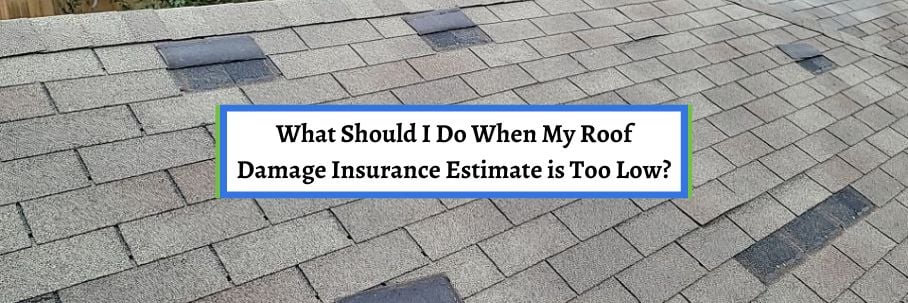Roof Damage | Insurance | Roof Estimates
What Should I Do When My Roof Damage Insurance Estimate is Too Low?

You pay your premiums on your Replacement Cost Value insurance policy so that your homeowners insurance protects your roof if it’s damaged by a storm. But when the time comes to use it, the insurance company doesn't give you enough money to cover your roofing contractor’s scope of work.
This is not only frustrating, but it also makes some homeowners think they're being price gouged by a roofer. But the truth is, there’s a reason an insurance estimate is lower than a roofing contractor’s estimate.
For over 30 years, the team at Bill Ragan Roofing has helped homeowners understand everything about getting their roof replaced by the insurance company. Because of this, I’ll help you understand why there’s a difference in the estimates and your options if it happens.
This article starts by answering the question of why your insurance estimate is lower than your roofing contractors. After that, you’ll learn the available options if this happens to you.
Why is your insurance estimate lower than the roofing contractor’s estimate?
The reason your insurance estimate is lower than your roofing contractors is simply because the insurance company left off certain line items. They could leave off certain roofing components or code upgrades, but it mostly revolves around a roofing contractor’s overhead and profit.
Now you may think, “Why can’t you just do it for the money insurance gives me?” Well, roofing companies are for-profit businesses that need to make a certain amount of profit on each job to keep the doors open.
Unfortunately, insurance companies don’t necessarily care. In fact, General Overhead expenses are not included in Xactware’s unit pricing (the software insurance companies use to determine pricing).
Instead, they add it to the estimate as a percentage of the total bid and the appropriate profit margin. This is not enough to cover the expenses of a reputable business.
Just know that you can probably find a roofer who will do it for the amount that insurance gives you. But research the company thoroughly before jumping at their lower estimate, and NEVER listen to a company willing to pay your deductible.
3 options when insurance doesn't cover the full cost of your roof replacement
Now you know why your insurance estimate is lower than your roofing contractor’s estimate. But what are your options if this happens?
Let’s get to your 3 options when the insurance company doesn’t give you enough money to cover the entire cost of your insurance roof replacement. Just know that this is if you have an RCV insurance policy.
1. Supplement the roof damage insurance claim
Your first option when the insurance company doesn’t cover the full cost of your roof replacement is to supplement the claim. Supplementing an insurance claim means doing the due diligence and putting in the work to get everything covered by your insurance company.
This includes every line item (including local codes), labor, dump fees, overhead, profit, and everything in between. A reputable roofing contractor will help you do this, but every company does it differently.
For example, we provide a checklist with every line item that an insurance estimate should include. This gives our customers the power to go through their claim, find what’s missing, and send it back to their insurance company to get the rest covered.
Just know that some insurance companies give homeowners some pushback on supplementing. But you pay your insurance premiums for this very reason, and the insurance company should adhere to the policy.
2. Pay out of pocket to make up the difference
To be completely transparent, supplementing a claim takes a lot of time and can take months to get approved. Because of this, some homeowners avoid supplementing their claim.
If you don’t want to deal with supplementing, your next option is using the money insurance provides to pay as much as possible and make up the difference out of pocket. This option means you’ll get a large portion or almost all of your roof replacement covered, but it does mean upfront money out of your pocket plus your deductible.
This is the easiest option for homeowners who are happy with their payout and have the budget to cover the difference. Because it’s the easiest, it’s also the most common way to deal with insurance not giving you enough money.
3. Finance your roof replacement
The next option isn’t as common as the others, but it’s becoming more popular. This last option is to finance your new roof when insurance doesn’t cover the full cost of your roof replacement.
Just like financing a car, you can finance your roof replacement. This option lets you make monthly payments like a car loan while keeping the insurance money minus your deductible.
It’s a pretty easy process to finance a new roof, but it varies depending on the roofing contractor. First, you’ll get an estimate for the cost of your new roof from a local roofing company.
After learning the price of your new roof, you’ll either do in-house financing or be directed to their financing partner. Depending on your credit score, you’ll get approved, decide how long you want to make payments, and agree on a monthly payment.
After the roof replacement process is complete, you’ll sign off that you’re happy with the work, and your payments begin 30 days after they pay your roofing contractor. With financing, everyone wins.
The roofing contractor gets paid the right amount, and you get to keep your insurance money (minus your deductible) while making monthly payments.
Why shouldn’t you go price shopping when getting an insurance roof replacement?
Now you know your options when your insurance estimate isn’t enough to cover your full roof replacement. Each option has pros, but it’s up to you to determine which one is right for your situation.
I understand the frustration that comes with not getting your entire roof replacement covered by your insurance company. Unfortunately, this frustration leads some homeowners to go price shopping to find any company willing to do it for cheaper or what insurance pays.
While this is their right, it creates the perfect opportunity for a roofing contractor to take advantage of them. I don’t want this to happen to you.
That’s why I wrote another article breaking down why you shouldn’t look for the cheapest price possible, especially when insurance is involved.
Check out 4 Risks of Trying to Find the Cheapest Price for Your Roof Replacement to learn why you shouldn’t look for the cheapest roof possible.


